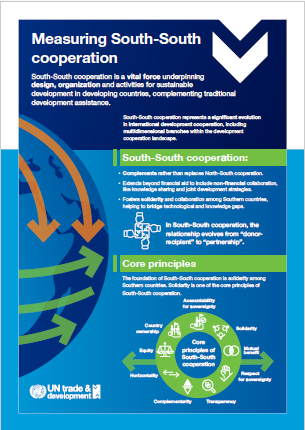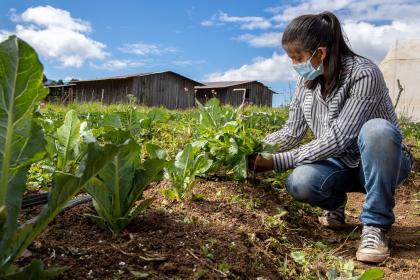The outcome document of the second High-level United Nations Conference on South-South Cooperation (A/RES/73/291) encourages all actors to support initiatives for information and data collection, coordination, dissemination and evaluation of South-South cooperation (SSC), upon the request of developing countries.
In April 2020, the Inter-Agency and Expert Group on Sustainable Development Goal Indicators established a Working Group on Measurement of Development Support.
The Working Group developed a proposal for Sustainable Development Goal (SDG) indicator 17.3.1, defining key measurement principles and main components of development support, including SSC.
This work thus resulted in an agreed, voluntary Conceptual Framework (CF) for the measurement of SSC, developed by countries of the global South, adopted by the UN Statistical Commission and the General Assembly in 2022.
It was also “requested that further work on this, including on global reporting and capacity-building, be enabled by the co-custodianship of UNCTAD and be led by countries from the global South, building on country-led mechanisms”.
In this project, UNCTAD, UN Statistics Division and four UN Regional Commissions, jointly with partners in the UN system and beyond, will support eight developing countries in Africa, Asia and Latin America to measure the financial and non-financial modalities of SSC to inform and target policy action with the aim to manage and mobilize resources for efforts to achieve the SDGs.
The expectation is that all pilot countries will collate data on SSC onto the Framework, prepare initial estimates of SSC and test the methodology for SDG indicator 17.3.1. Results will be compared to existing data on SSC or Official Development Assistance (ODA) where available. This will give a clearer picture of the type and size of SSC in each country.
The project will strengthen national coordination among international development and statistical authorities, and internationally with the Regional Commission and UNCTAD Statistics, the external sector, and international development agencies.
The pilots will provide feedback on the feasibility and challenges of measuring SSC by applying the Framework. In the longer term, the sharing of resources and tools developed in the project will enable global reporting on SDG indicator 17.3.1
Objective
To strengthen the capacity of developing countries in Africa, Asia and Latin America to measure and report the contribution of South-South Cooperation to progress in the 2030 Agenda and towards more inclusive and sustainable economic growth.
Link to SDGs
Primary target: 17.3: Mobilize additional financial resources for developing countries from multiple sources. This target supports the achievement of all SDGs.
Secondary SDG targets include: 17.4, 17.6, 17.9, 17.16, 17.19 and 9.1.
Planned activities
The first phase (create) will consist of preparing the ground for action by raising awareness in regional events and developing a refined framework, tools and resources for data collection, compilation and reporting in early pilots and expert meetings with pioneering countries.
The second phase (master) will apply these resources to beneficiary countries starting with peer learning in an inter-regional workshop, e-learning, study tours to pioneering or other countries as useful, and national workshops to build the capacity of national stakeholders to measure and report SSC.
The third phase (expand) will share the tools, findings and resources with national and global stakeholders.
Downloads:
|



